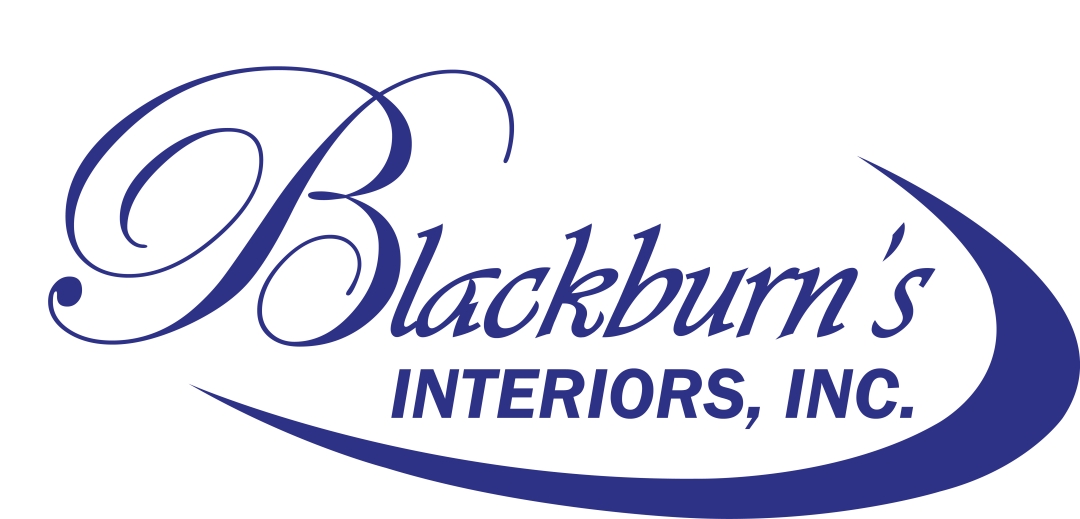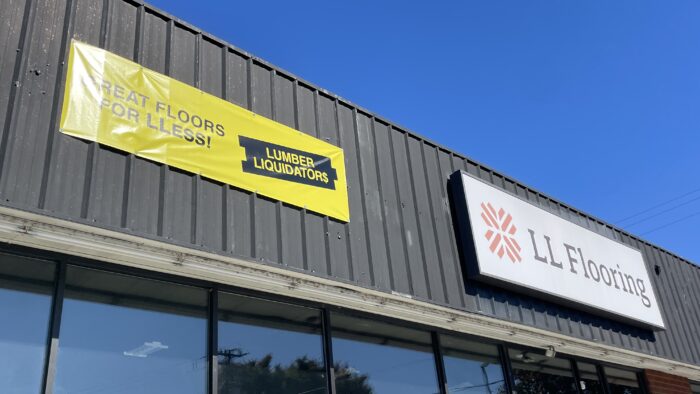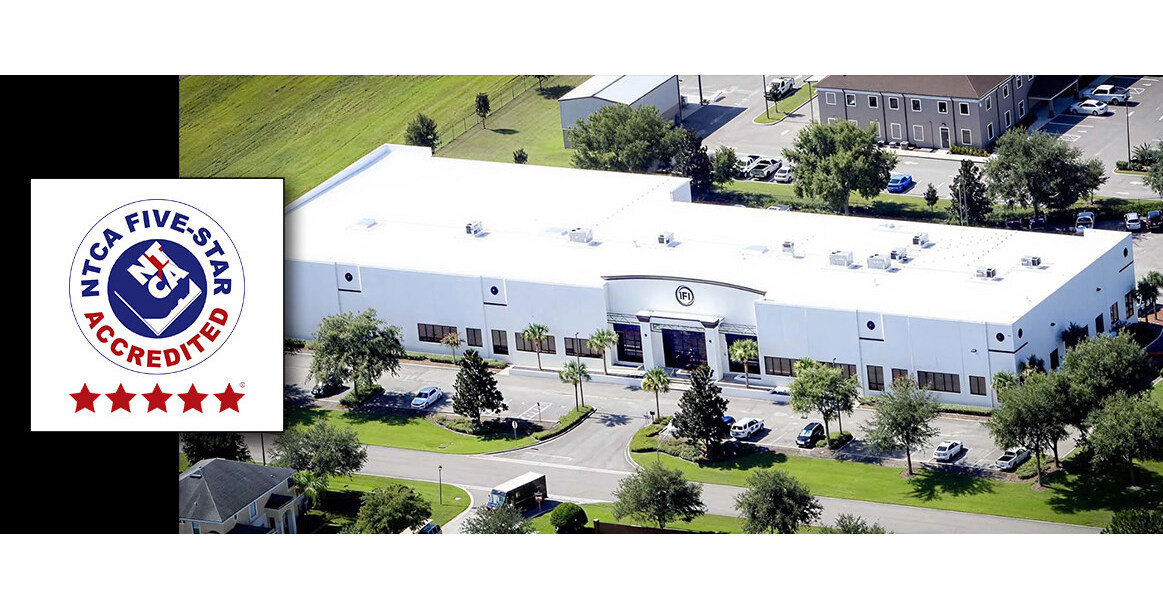The storefront at 8818 W. Broad St., where the Lumber Liquidators sign has recently been added next to the LL Flooring name.
The Lumber Liquidators brand is back in Richmond.
Revived in recent weeks after the bankruptcy sale of its successor brand LL Flooring, the first glimpse of the return of Lumber Liquidators to its hometown is now visible atop the chain’s store at 8818 W. Broad St.
Passersby will see the familiar yellow and black signage with the Lumber Liquidators name has been hoisted up next to the retiring LL Flooring name.
That’s the doing of Tom Sullivan. He founded Lumber Liquidators in the mid-1990s, took it public in 2007, ran it until 2016, and bought back the remnants of the company, including 219 of its 430stores and its intellectual property, at a bankruptcy court-ordered sale a few weeks ago.
Sullivan’s first order of business was to ditch the LL Flooring brand and switch back to the name he came up with 30 years ago.
In an interview with BizSense this week, Sullivan said the signage switch is just one of many changes he’s instituting now that he’s back in control.
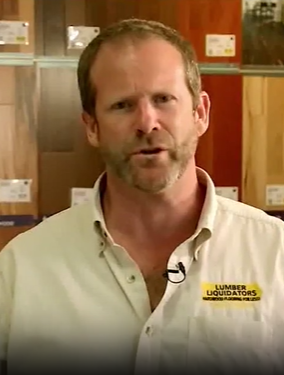
Thomas Sullivan, as seen in a Lumber Liquidators commercial in 2015.
“You can expect back to basics, back to good deals and good flooring. Just basically back to what it was before, without a lot of bureaucratic nonsense or high prices… back to what we were known for – a good product at a good price,” Sullivan said.
Another noticeable change for the company locally, Sullivan said, is that the now-privately held Lumber Liquidators won’t be using publicly traded LL Flooring’s headquarters in Libbie Mill in Henrico.
But Sullivan’s new incarnation of the company will remain based in the Richmond region, at least for now.
He said the company’s headquarters is now housed in a massive distribution center in White Oak Tech Park in Sandston, where it will employ around 150 workers. The 1 million-square-foot building at 6115 Technology Creek Drive had been owned by LL Flooring corporate, but it too was sold off through the bankruptcy process at a price of $104 million.
The buyer in that deal was data center giant QTS, which agreed to lease the building for at least two years to Sullivan’s group.
Sullivan said his deal with the LL Flooring bankruptcy estate did not include an assumption of the headquarters lease at 4901 Bakers Mill Lane in Libbie Mill.
“LL Flooring will be going away. We’ve moved the people we need down to Sandston and we’re shipping out of there,” he said, adding that the Libbie Mill building is still being used by the bankrupt shell of LL Flooring as it winds down.
Sullivan has previously criticized LL Flooring’s management for moving into the 53,000-square-foot Libbie Mill building in the first place, arguing it was an unnecessary expense and too extravagant of an office for a company that had humble beginnings.
“Our first office was about 15 feet by 15 feet above the store with a port-a-potty in the parking lot,” he said.
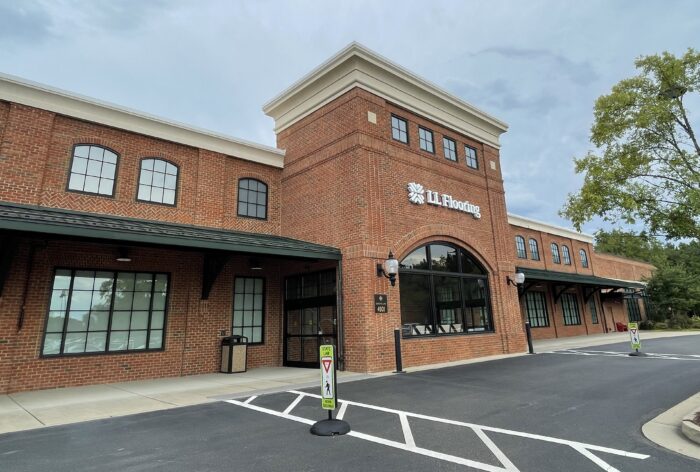
LL Flooring’s headquarters at Libbie Mill Midtown. (BizSense file photo)
Sullivan also is cutting back on the brand’s retail presence locally. He said he plans to have only one Lumber Liquidators store in the Richmond market in the long-term. For now, that will be at the existing Broad Street store, which his company is leasing.
Sullivan’s group did not purchase the rights to LL Flooring’s other local store at 9990 Robious Road in Chesterfield. That location is being liquidated through the bankruptcy court, along with 200 others nationally that Sullivan didn’t want.
Sullivan said he prefers to own his store’s buildings and may look to relocate the Broad Street store elsewhere in the area for that purpose. He’ll also look to potentially combine Lumber Liquidators and an outpost of his Cabinets To Go chain under one roof locally. Cabinets To Go, which has around 100 locations nationally, has just one store in the region at 2305 Westwood Ave. across from Topgolf.
Having spent years trying to buy LL Flooring and take it private only to be rebuffed by its leadership, Sullivan said he has a range of emotions after finally achieving his goal but having it come only as a result of the company falling into bankruptcy.
“It was sad to see it bankrupt,” he said.
In the end, Sullivan said the $40 million he paid for the assets in the bankruptcy sale works out to be about the same price as what he was offering pre-bankruptcy.
While his aim is to return the company to its former glory, Sullivan said he has no intention of ever making Lumber Liquidators a publicly traded company again.
Indeed, the new Lumber Liquidators homepage makes those feelings clear, stating, “In 2007 we had the brilliant idea of going public and the company soon lost what had made it great…”
Sullivan said he’s confident in his bet that the Lumber Liquidators name still has value and a strong enough reputation to bring customers back. He said the biggest problem he faces is explaining to consumers and suppliers that the company – at least the pieces of it that he bought out of bankruptcy – is still up and running after LL Flooring’s disjointed, on-again, off-again handling of its Chapter 11 process.
“There’s still a good business there and a recognized name,” he said.
Sullivan maintains his argument that the company’s biggest mistake was when its management decided four years ago to change the name from Lumber Liquidators to LL Flooring. That move was made after his departure and in an effort to ditch what was seen as a tarnished image from a damning “60 Minutes” exposé in 2015 related to claims of unsafe levels of formaldehyde in flooring it had imported from China and other legal issues.
Sullivan said he never wavered in his belief that Lumber Liquidators was still the better brand. He recalled an anecdote from four years ago, when the signage was being changed from Lumber Liquidators to LL Flooring on one of its stores in a building that he owned and was leasing to the company.
“I told them just to keep the Lumber Liquidators sign in the back so when they go bankrupt, I could put it back up,” he said. “It was kind of a joke, but not really.”

